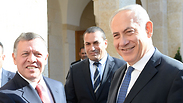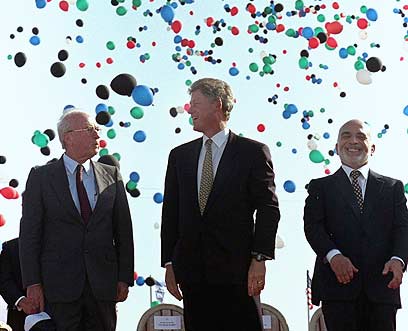
Netanyahu and King Abdullah. 'Strategic peace deal between parallel systems in Amman and Tel Aviv'
צילום: קובי גדעון, לע"מ
The hidden fruits of Israel-Jordan peace
Analysis: Israeli-Jordanian normalization is taking place under the table in the form of professional consultations and excellent security cooperation over the past 20 years.
A privileged Jordanian businessman innocently approached an Israeli counterpart with connections in the right places, and offered him a dreamlike partnership: Completing the funding of a private hospital in Amman, personally selecting the CEO who would run the institution, and recruiting a team of experts to train the doctors and nurses at the hospital.

The businessman from Amman prepared an impressive album with simulation images and a rational specification of the required investment sum and the manpower quota. He did a professional job.
The album was submitted to the consideration of senior health establishment officials in Israel. The offer appeared promising, both from the business aspect and on the level of leveraging cooperation.
But no one here accepted the challenge. They looked at it, reviewed it, were impressed, and sighed. The money, a potential Israeli investor explained, is not a problem. But who will agree to go to Jordan? How will we cover life insurances? How will we hire a local lawyer in case of a legal claim? Who will disperse the angry protests at the hospital's gates when people find out that a team of the "Zionist enemy" is working there?
The initiative died shortly before the 20th anniversary of Israel's peace agreement with Jordan, which is marked Sunday. The businessman on the other side of the border sounded disappointed and exhausted. His dream of fulfilling normalization got a huge slap in the face.
He personally promised businesspeople in Israel that he would not employ a Jordanian medical team which would refuse to undergo professional training or work with Israelis. That didn't convince anyone.
The Jordanian side found a more convenient arrangement: The palace discreetly sends patients to Israel and pays for their treatment. Four hospitals have a special liaison with the palace in Amman, who takes care of the transfer and hospitalization.
Under the table, as they say, professional consultations are taking place. But we have yet to reach the moment in which a patient from Amman will have the courage to present to a local pharmacy a prescription signed by an Israeli doctor.

Then-prime minister Yitzhak Rabin (L), then-US president Bill Clinton and then-Jordanian King Hussein at the Peace Accord signing ceremony. 'For the past 20 years, thousands of Israelis owe their lives to Amman's security organizations' (Photo: AP) (צילום: איי פי)
As far as the king's palace is concerned, they would like to get through the 20th anniversary of the peace agreement without any celebrations, without special television broadcasts and without interviews. There is no cause for celebration.
What happened and what is happening now has been sentenced to remain under the rug: A strategic peace agreement between parallel systems in Amman and Tel Aviv which aims to maintain our longest border and contribute to the removal of security obstacles in the kingdom.
And when there is no reason for releasing white doves into the air, the Jordanian media are settling accounts. The articles summing up 20 years of peace go back in time, exposing the conduct of the political-security forum which reached what they refer to as the "Arava Valley agreement" rather than a "peace agreement."
The reader can learn for the first time how the late King Hussein passed the "one vote" law (allowing a vote for only one candidate rather than for a political bloc) in the parliament elections, in order to gain a weak parliament which would not oppose the agreement. Another law restricted mosque preachers, in a bid to stop them from inciting the street.
A secret survey conducted by the kingdom's governmental systems revealed an alarming rate of opposition to peace with Israel. The palace came up with a strict law limiting the media as well, in order to prevent criticism. We are left with the professional unions, which still waving "black lists" against anyone caught in an act of "normalization" with "the enemy."
Looking back, both sides gained an agreement but missed opportunities. Nonetheless, there is peace. There is a Jordanian ambassador in Tel Aviv (while there isn't an Egyptian one), there is an Israeli ambassador working from a fortified compound in Jordan, the Israelis have discovered Petra and Aqaba and hundreds of Jordanian laborers work in Eilat.
We will continue not to talk about the security work. They are doing a good job there, and those who know about it are willing to keep silent. For the past 20 years, thousands of Israelis owe their lives to Amman's security organizations.










